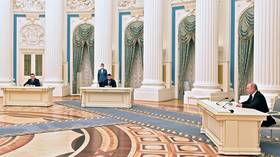

Moscow officially recognized the independence of the two breakaway regions on Monday.
Putin has instructed the Defense Ministry to send peacekeepers into the Donbass, while telling the Ministry of Foreign Affairs to establish diplomatic relations with the states.
The Kremlin’s official move comes shortly after Putin’s lengthy address to the nation on Monday evening. In it, he explaiened the step as a long overdue response to what he described as the “brotherly” Ukrainian nation becoming a “colony” of the West and falling under the rule of a “russophobic” government both hostile to Moscow and denying ethnic Russians and Russian-speakers basic human rights.
Donetsk and Lugansk declared independence from Kiev in 2014, after US-backed nationalists overthrew the democratically elected government in the Maidan coup. However, Moscow has refused to recognize them until now, saying the problem is an internal affair of Ukraine and needs to be resolved according to the Minsk agreements, which established an uneasy armistice in 2015.
Earlier on Monday, however, the Donetsk leader Denis Pushilin and Lugansk leader Leonid Pasechnik formally requested recognition from Moscow once again, as both Donbass regions and Ukraine claimed intensive artillery exchanges along the armistice line.
In his speech, Putin said that the Minsk process had failed and that Ukraine is “not interested in peaceful solutions – they want to start a Blitzkrieg.”
Details of Russia-Donbass cooperation treaty emerge
While the treaties of friendship and cooperation between Russia and the newly recognized republics of Donetsk and Lugansk are still in the draft stage, the Russian State Duma has released the proposed documents on Monday, showing that they will include common defense against external aggression and the right to use each other’s military infrastructure, among other things.
Russian President Vladimir Putin has recognized the people’s republics of Donetsk and Lugansk – two breakaway regions in eastern Ukraine – as independent states on Monday.
The State Duma overwhelmingly voted in favor of recognizing the rebel regions last week. The draft treaties of friendship and mutual assistance with both newly recognized states – due to last at least 10 years – have now been published on the legislature’s website.
Of particular interest is Article 5, which gives both contracting parties the right to “build, use and improve military infrastructure, bases and other objects on their territory.” The Kremlin has already ordered Russian troops to deploy into the two areas as peacekeepers, pending a formal treaty on military cooperation.
Article 6 bars both parties from “entering any blocs or alliances directed against either of them” and will not allow their territory to be used for launching attacks against one another.
Article 11 envisions free movement of citizens between the contracting parties, and obligates both Russia and the republics to “develop and implement an agreed set of measures to regulate the regime of entry into and exit from their territory of citizens of third countries.”
Article 13 also obligates the contracting parties to protect the “ethnic, linguistic, cultural and religious identity of national minorities in their territories and create conditions to preserve and develop” these identities while guaranteeing individual and collective minority rights “without being subjected to any attempts of assimilation against their will.”
Donetsk and Lugansk declared independence from Ukraine in 2014, after US-backed nationalists overthrew the democratically elected government in Kiev. They sought recognition from Russia at the time, but Moscow declined, insisting their conflict was an internal Ukrainian matter.
Russia had joined France and Germany in the so-called Normandy Format to mediate an armistice between Kiev and the rebels in Minsk in 2014-2015. The process envisioned Ukraine giving the two regions broad autonomy, but Kiev repeatedly declined to live up to its obligations – instead changing Ukraine’s constitution to make that impossible.
Putin cited this development and accused Ukraine of wanting to conquer the two regions by force, in his speech on Monday announcing the recognition of the Donbass republics as a move “long overdue.”









